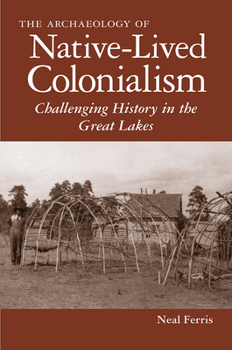The Archaeology of Native-Lived Colonialism: Challenging History in the Great Lakes
(Part of the Archaeology of Indigenous-Colonial Interactions in the Americas Series)
Select Format
Select Condition 
Book Overview
Colonialism may have significantly changed the history of North America, but its impact on Native Americans has been greatly misunderstood. In this book, Neal Ferris offers alternative explanations of colonial encounters that emphasize continuity as well as change affecting Native behaviors. He examines how communities from three aboriginal nations in what is now southwestern Ontario negotiated the changes that accompanied the arrival of Europeans and maintained a cultural continuity with their pasts that has been too often overlooked in conventional "master narrative" histories of contact. In reconsidering Native adaptation and resistance to colonial British rule, Ferris reviews five centuries of interaction that are usually read as a single event viewed through the lens of historical bias. He first examines patterns of traditional lifeway continuity among the Ojibwa, demonstrating their ability to maintain seasonal mobility up to the mid-nineteenth century and their adaptive response to its loss. He then looks at the experience of refugee Delawares, who settled among the Ojibwa as a missionary-sponsored community yet managed to maintain an identity distinct from missionary influences. And he shows how the archaeological history of the Six Nations Iroquois reflected patterns of negotiating emergent colonialism when they returned to the region in the 1780s, exploring how families managed tradition and the contemporary colonial world to develop innovative ways of revising and maintaining identity. The Archaeology of Native-Lived Colonialism convincingly utilizes historical archaeology to link the Native experience of the eighteenth and nineteenth centuries to the deeper history of sixteenth- and seventeenth-century interactions and with pre-European times. It shows how these Native communities succeeded in retaining cohesiveness through centuries of foreign influence and material innovations by maintaining ancient, adaptive social processes that both incorporated European ideas and reinforced historically understood notions of self and community.
Format:Paperback
Language:English
ISBN:0816502382
ISBN13:9780816502387
Release Date:October 2011
Publisher:University of Arizona Press
Length:240 Pages
Weight:0.85 lbs.
Dimensions:0.6" x 6.0" x 9.0"
Customer Reviews
0 rating





